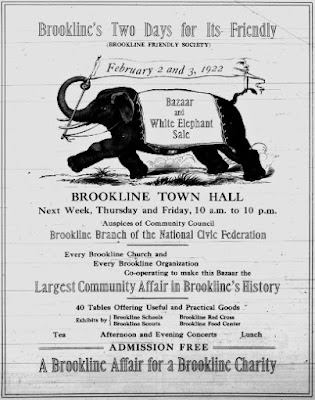 |
| February 2, 1922 Image via Brookline Newspaper Archive, Public Library of Brookline |
February 1, 1881 - First list of telephone subscribers distributed
January 31, 1887 - Fire at Metropolitan Railway barn
February 2, 1922 - Civic Bazaar to benefit Brookline Friendly Society
February 2, 1937 - Indictments in police bribery, prostitution scandal
February 1, 1881
First list of telephone subscribers distributed
Less than five years after Alexander Graham Bell was awarded a patent for the telephone and one year after service came to Brookline, the town's first directory of telephone subscribers was distributed. There were 82 subscribers listed.
Subscribers paid three dollars per month for service within the town, with an additional 15¢ for each call to Boston. (Six dollars a month bought unlimited calls to Boston.) Calls were limited to five minutes. Subscribers could pay extra to have bells attached to their phones.
The Brookline Telephone Exchange connected subscribers through the Holtzer Cabot Electric Company building on Station Street. Four decades later, the Aspinwall telephone exchange building on Marion Street became the first in New England to provide direct dialing without going through an operator. (See Dial Telephones in Brookline: A New England First in Muddy River Musings.)
January 31, 1887
Fire at Metropolitan Railway barn
A middle of the night fire at the Metropolitan Railway barn at the corner of Walter Avenue and Morss Street in Brookline Village resulted in thousands of dollars in damages to cars of the horse-drawn street railway. Twelve of the 20 cars were damaged, according to the Boston Transcript.
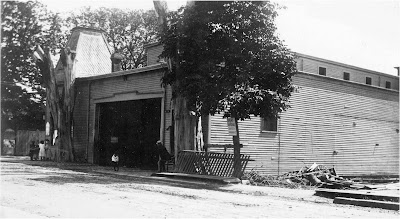 |
| Metropolitan Railway barn (View larger, zoomable image) |
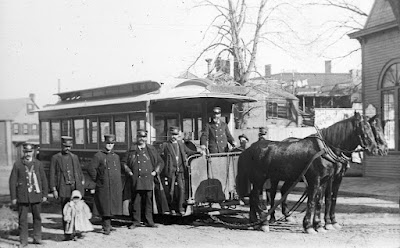 |
| A horse-drawn railway car outside the barn in 1893. (See larger view) |
February 2, 1922
Civic Bazaar to benefit Brookline Friendly Society
The Brookline Friendly Society was a social service organization that provided health and social services for Brookline residents. It began in 1886 as the Brookline Union with a mission to promote "temperance and good citizenship, encouragement of athletic exercises, and establishment and maintenance of rooms for reading and for social meetings in Brookline."
The Union constructed a brick building at the foot of High Street. Its social service operation took the name of the Brookline Friendly Society and continued under that name until 1999 when it began providing grants rather than direct services and changed the name to the Brookline Community Fund. It was changed to the Brookline Community Foundation in 2005.
 |
| The Friendly Society's building stood at the corner of High Street and Walnut Street |
The 1922 Civic Bazaar -- an advertisement for it is shown above -- was a big event held in Town Hall designed to celebrate and raise funds for an organization described by the Brookline Chronicle as "a worthy Brookline charity maintained by Brookline people for Brookline residents needing its help."
Many local organizations took part, selling food, sponsoring games, and offering services. The two-day event raised several thousand dollars on behalf of the Society.
February 2, 1937
Indictments in police bribery, prostitution scandal
A corruption scandal erupted as six men, including three police officers and a local doctor, were arraigned in connection with a prostitution ring operating out of an apartment building on the corner of Ivy and St. Mary's Streets.
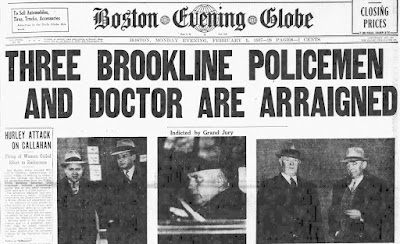 |
| Boston Globe headline, February 2, 1937 |
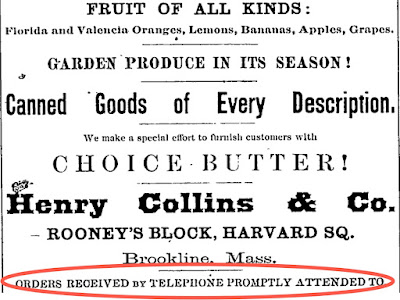
No comments:
Post a Comment